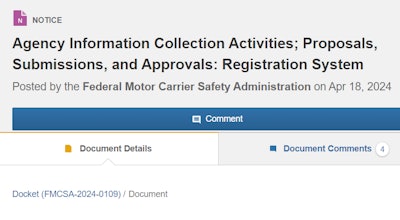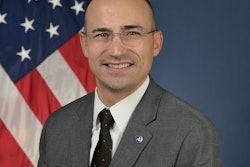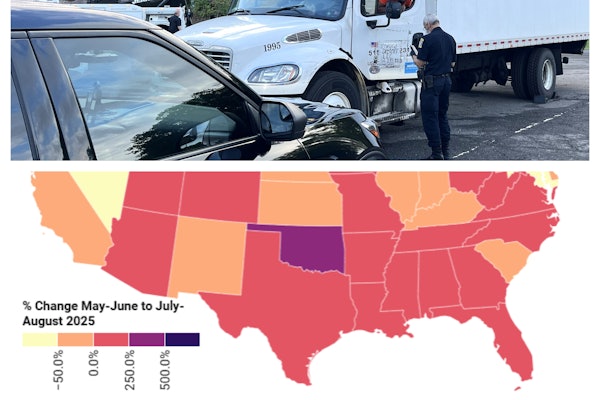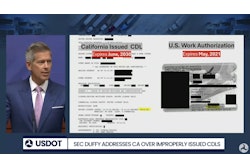
The Federal Motor Carrier Safety Administration's plan to “clean up the bad actors” and freight fraudsters in trucking with an overhaul of its registration system represents a "significant step" towards modernizing and securing the industry, but has serious shortcomings, according to comments to the docket about those changes at Regulations.gov.
The new system, dubbed the FMCSA Registration System (FRS), will eliminate a number of forms currently used by motor carriers and others in the transportation industry, including the MCS-150, BOC-3, OP-1 and more, integrating them all into a new online system.
That system, as described by Ken Riddle, director of the Office of Registration and Safety Information at FMCSA, would also implement identification and business verification tools into the FRS and not allow registrants to proceed until they've proven their identity and that their business exists and is registered with the IRS or the state.
Overall, the FRS represents a massive undertaking FMCSA hopes to turn around in total by the end of 2025.
[Related: Does FMCSA registration overhaul have a sole-proprietor problem?]
Only four comments were filed on the Regulations.gov docket in the two months the comment period was open (it closed June 18), yet each raised significant issues with the proposed new system.

A comment from a coalition of transportation, logistics and security organizations penned by attorneys Hank Seaton and Mark Andrews commended FMCSA "for recognizing that closer scrutiny of registration applications is necessary to prevent supply chain fraud ranging from identity theft to stolen loads." Yet Seaton and Andrews noted the FRS's single online questionnaire "would not be nearly enough unless backed up by hands-on vetting and verification of applicants before operating authority is granted."
They contended the FRS alone is "an incomplete and piecemeal approach to the need for investigating the authenticity and safety fitness of applications for registration."
Seaton and Andrews also take issue with the legal basis for FMCSA's approach to the registration overhaul, arguing the agency had actually engaged in proposed rulemaking, not just an "information collection" effort, with their Federal Register publication and solicitation of feedback. Furthermore, the attorneys questioned FMCSA's hesitance to "penalize perpetrators of registration fraud," stating the agency had the power, and in fact previously had hit "reincarnated" carriers with thousands in fines.
FMCSA recently told Overdrive it does not pursue perjury charges against carriers, brokers and other registered entities found to have lied in their applications, even though the OP-1 form threatens perjury charges and up to $10,000 in fines and a year in jail.
[Related: Are double brokering entities committing perjury? FMCSA weighs in]
Seaton and Andrews instead called for FMCSA to postpone its current move toward the FRS and reinitiate the process as a proper rulemaking notice, and answer the dearth of penalties and prosecutions against fraudulent actors. They cited pending legislation that would create a Supply Chain Fraud and Theft Task Force, if the House of Representatives version of the Department of Homeland Security appropriations bill becomes law (similar standalone legislation to that effect was also recently introduced in the House). FMCSA, the attorneys argued, should wait on that before making big moves. They called for a “Whole of Government” approach to fighting freight fraud, calling for FMCSA to work with other federal agencies as "force multipliers."
As an example, Seaton and Andrews noted the "Corporate Transparency Act (31 USC 5336) now requires most U.S. companies throughout the economy to report their corporate affiliations to the Treasury Department’s Financial Crimes Enforcement Network (FinCEN). As FinCEN grows its database, FMCSA and Treasury should be able to cooperate on efforts to prevent scofflaw carriers and intermediaries from registering new affiliates as 'chameleon' operators," they wrote.
[Related: Financial Crimes Enforcement Network's new reporting requirement hits owner-ops, small fleets]
The American Trucking Associations filed commentary that echoed many of Seaton and Andrews' points, also commending the agency for its "efforts to address mounting fraud in the industry through its proposed transition to a new FMCSA Registration System." ATA also offered a long list of additional recommendations.
These included keeping the regulatory burden on existing and legitimate carriers, brokers and other entities light as well as stepping up ID verification requirements and requiring multi-factor authentication for all accounts.
ATA gave an example of how FMCSA should improve it's data quality and block bad actors, citing anecdotes from its members. "For instance, numerous carriers register at a single address located in an apartment complex or strip mall, all using a single email address," ATA said. "FMCSA should implement rigorous data validation processes at the point of entry to minimize errors and inconsistencies."
ATA also asked that FMCSA ensure "email and physical mailing addresses used during the registration process are valid, and matching a carrier’s reported fleet size to its number of drivers" before granting authority. ATA noted FMCSA could cross-reference and audit carrier data across its various platforms and databases (i.e., FMCSA Licensing & Insurance, Safer, URS, and Registered Mover databases), something Riddle has noted was certainly on the agency's radar to do with the overhaul.
ATA and the alliance represented by Seaton and Andrews agree that the FRS alone won't stop fraud until the agency takes a holistic approach. After all, it only takes one bad actor within a fleet or brokerage to create opportunities for fraud.
"FMCSA should also dedicate resources to better understanding and identifying sources of fraud, their prevalence, and the extent to which fraudulent practices are committed by individuals acting within legitimate organizations," ATA wrote, whether among "brokers, freight forwarders, third parties, and intermediaries" involved in the application process.
Other comments also found shortcomings with FRS. A property management company commented with concerns about sole proprietorships, which don't always register with the secretary of state.
One commenter stressed the urgency of the fraud situation, particularly when it related to cargo theft through misdirection and other schemes -- CargoNet noted a 46 percent increase there in the first quarter of 2024 as compared to the first quarter of last year, representing an estimated $154.6 million in stolen goods.
"The problem is not a web site," the commenter wrote, "it is enforcing the law, there are are already laws on the book to stop bad actors, if somebody would enforce them! is this going to stop brokers from taking 70%, double brokering 4 times, or is it going stop fake trucking companies operating and scamming everyone?"













